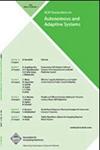SARDE:一种持续自适应资源需求估计框架
IF 2.2
4区 计算机科学
Q3 COMPUTER SCIENCE, ARTIFICIAL INTELLIGENCE
引用次数: 2
摘要
JOHANNES GROHMANN,德国维尔茨堡大学SIMON EISMANN,德国维尔茨堡大学ANDRÉ BAUER,德国维尔茨堡大学SIMON SPINNER,德国IBM JOHANNES BLUM,德国康斯坦茨大学NIKOLAS HERBST,德国维尔茨堡大学SAMUEL KOUNEV,德国维尔茨堡大学资源需求是建模和预测软件系统性能的关键参数。目前,资源需求估计通常只执行一次,用于系统分析。然而,被监视的系统以及资源需求本身在运行时环境中受到不断变化的影响。这些变化还会影响适用性、所需的参数化以及单个估计方法的准确度。随着时间的推移,这会导致无效或过时的估计,进而对自适应系统的决策产生负面影响。本文提出了连续环境下自适应资源需求估计框架SARDE。SARDE动态地、持续地调整、选择和执行资源需求估计方法的集合,以适应环境的变化。这创建了一种自主且无监督的集成估计技术,在动态环境中提供可靠的资源需求估计。我们使用两个真实的数据集来评估SARDE。一组不同的微基准测试反映不同可能的系统状态,一组数据包含在不断变化的环境中持续运行的应用程序。研究结果表明,通过不断地进行在线优化、选择和估计,SARDE能够有效地适应在线跟踪,并利用所得到的集成技术减小模型误差。CCS概念:•计算方法→学习范式;模型开发与分析;•软件及其工程→软件性能。额外的本文章由计算机程序翻译,如有差异,请以英文原文为准。
SARDE: A Framework for Continuous and Self-Adaptive Resource Demand Estimation
JOHANNES GROHMANN, University of Würzburg, Germany SIMON EISMANN, University of Würzburg, Germany ANDRÉ BAUER, University of Würzburg, Germany SIMON SPINNER, IBM, Germany JOHANNES BLUM, University of Konstanz, Germany NIKOLAS HERBST, University of Würzburg, Germany SAMUEL KOUNEV, University of Würzburg, Germany Resource demands are crucial parameters for modeling and predicting the performance of software systems. Currently, resource demand estimators are usually executed once for system analysis. However, the monitored system, as well as the resource demand itself, are subject to constant change in run-time environments. These changes additionally impact the applicability, the required parametrization as well as the resulting accuracy of individual estimation approaches. Over time, this leads to invalid or outdated estimates, which in turn negatively influence the decision-making of adaptive systems. In this paper, we present SARDE, a framework for self-adaptive resource demand estimation in continuous environments. SARDE dynamically and continuously tunes, selects, and executes an ensemble of resource demand estimation approaches to adapt to changes in the environment. This creates an autonomous and unsupervised ensemble estimation technique, providing reliable resource demand estimations in dynamic environments. We evaluate SARDE using two realistic data sets. One set of different micro-benchmarks reflecting different possible system states and one data set consisting of a continuously running application in a changing environment. Our results show that by continuously applying online optimization, selection and estimation, SARDE is able to efficiently adapt to the online trace and reduce the model error using the resulting ensemble technique. CCS Concepts: • Computing methodologies → Learning paradigms; Model development and analysis; • Software and its engineering→ Software performance. Additional
求助全文
通过发布文献求助,成功后即可免费获取论文全文。
去求助
来源期刊

ACM Transactions on Autonomous and Adaptive Systems
工程技术-计算机:理论方法
CiteScore
4.80
自引率
7.40%
发文量
9
审稿时长
>12 weeks
期刊介绍:
TAAS addresses research on autonomous and adaptive systems being undertaken by an increasingly interdisciplinary research community -- and provides a common platform under which this work can be published and disseminated. TAAS encourages contributions aimed at supporting the understanding, development, and control of such systems and of their behaviors.
TAAS addresses research on autonomous and adaptive systems being undertaken by an increasingly interdisciplinary research community - and provides a common platform under which this work can be published and disseminated. TAAS encourages contributions aimed at supporting the understanding, development, and control of such systems and of their behaviors. Contributions are expected to be based on sound and innovative theoretical models, algorithms, engineering and programming techniques, infrastructures and systems, or technological and application experiences.
 求助内容:
求助内容: 应助结果提醒方式:
应助结果提醒方式:


